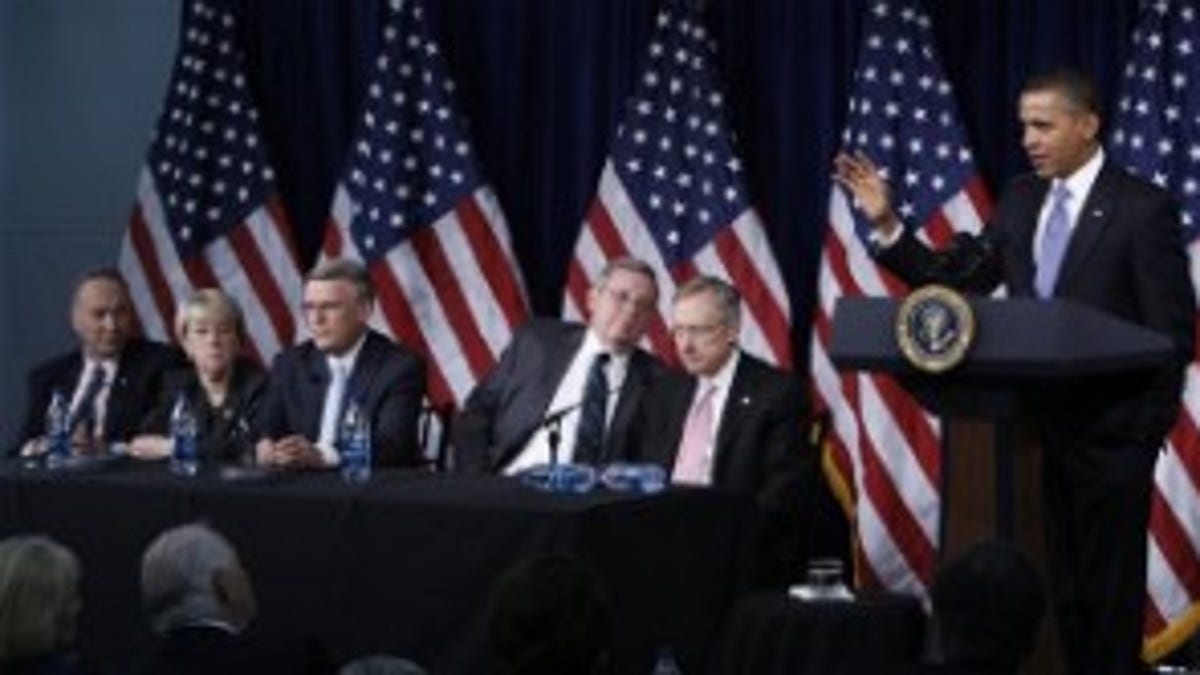
President Obama answers questions at the Senate Democratic Policy Committee Issues Conference. (AP Photo)
President Obama channeled the '70s rock band Boston to rally battle-scarred Senate Democrats demoralized by the loss of their super-majority in the Massachusetts Senate election.
The message: Don't Look Back.
Boston took that song to No. 4 on the Billboard charts in 1978. Obama wants Senate Democrats, trying to counter the perception that their agenda is now drifting aimlessly, to press ahead and, as their former colleague Edward Kennedy might say, do so with vigor.
"If anybody's searching for a lesson to Massachusetts, I promise you the answer is not to do nothing," Obama said in opening remarks meant to revive Senate Democrats. "We've got to finish the job on health care, we've got to finish the job on financial regulatory reform. We have to finish the job, even though it's hard."
Obama took questions from the Senate Democratic caucus, the first six from lawmakers seeking re-election, Pennsylvania's Arlen Specter, Colorado's Michael Bennett and Arkansas' Blanche Lincoln, New York's Kirsten Gillibrand, California's Barbara Boxer, and Vermont's Patrick Leahy. Of the 8 questions put to Obama, seven came from Democrats seeking re-election. The last question, on deficit reduction, came from Indiana's Evan Bayh, who is also seeking re-election and today learned he would face the former Republican occupant of his seat, Dan Coats.
Lincoln came the closest to criticizing Obama, quoting a small business owner from her state who wondered if anyone on the White House staff knew what it was like to "wake up on Monday and have to make a payroll by Friday."
Obama also told Specter he opposed eliminating trade ties with Communist China.
"I would not be in favor of revoking the trade relationships we've established with China," Obama said in response to a question about China's trading practices, long criticized in parts of industrial Pennsylvania. "Our future is going to be tied up with our ability to sell products all around the world and China's going to be one of our biggest markets."
Obama said the economy has begun to recover and the wrong course of action would be to revert to Bush-era polices, which he said minority Republicans currently favor, on taxes, lower regulation and opposition to comprehensive health care reform.
"If our response ends up being, because we don't want to stir things up here, we're just going to do the same thing that was done before," Obama said. "Then I don't know what differentiates us from the other guys. And I don't know why people would say 'Boy, we really want to make sure those Democrats are in Washington fighting for us."
Continuing the "don't look back" theme, Obama told Senate Democrats "we've got to be non-ideological about our approach to these things," setting up a brief narrative about avoiding the temptation to reach back to the Depression-era policies of Franklin Roosevelt.
"We don't want to be looking backwards," Obama said. "We can't just go back to the New Deal and try to grab all the same policies of the 1930s and think some how they would work in the 21st century."
There is also another place, or places, Obama said Senate Democrat shouldn't look: cable TV and political blogs.
"If everybody here turned off your CNN, your Fox, just turn off the TV, MSNBC, blogs and just go to talk to folks out there instead of being in this echo chamber," Obama said. arguing that on cable news and in partisan political blogs "it is much more difficult to get a conversation focused on how are we going to help people than a conversation about how is this going to help or hurt somebody politically.
Obama also criticized Senate Republicans for demanding Democrats produce a 60-vote majority for issues big and small.
"You had to cast more votes to break filibusters last year than in the entire 1950s and '60s combined," Obama told Senate Democrats, conveniently skipping over the Democratic use of the filibuster in 1990s and the first decade of the 21st century. "That's 20 years of obstruction packed into just one. "
"If you want to govern then you can't just say no," Obama said to the newly energized 41-member GOP Senate caucus. "It can't just be about scoring points."
Republicans responded by pointing to Obama's comment last fall that Congress had already made history in terms of accomplishments.
"If We Stopped Today," Obama said on Oct. 16 fund-raiser for the Democratic National Committee. "This Legislative Session Would Have Been One Of The Most Productive In A Generation."
Republicans argued the president can't claim historic accomplishments and denounce record GOP obstruction at the same time.
But on the issue where the GOP used the filibuster to great advantage, health care, Obama admitted tactical mistakes, at one point labeling the legislative process - filled near the end with late-night, closed door, Democrats-only negotiations - as "painful and messy."
"I take some fault for this: at the end of the process when we were fighting through all of these filibusters and trying to get it done quickly so that we could pivot and start talking about other issues that were so important to the American people, some of that transparency got lost and I think we paid a price for it," Obama said.
For more, watch my report tonight at 6:00pm on "Special Report with Bret Baier" and make sure to tune in to their online show at 7:00pm, directly after the television broadcast.












































